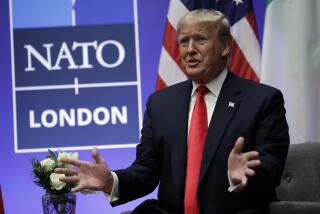New Deal for Poland
- Share via
President Reagan, while noting that the Communist government of Poland continues to stifle the Polish people’s quest for greater freedom, has lifted the remaining economic sanctions that were imposed on Poland after the declaration of martial law in December, 1981. It is a wise move.
The sanctions were imposed as an expression of outrage at the Warsaw regime’s crushing of the independent trade union Solidarity, and the imprisonment of Solidarity activists who agitated for liberalization of the political system. As such, the sanctions were welcomed by the Polish people, who hoped that they would provide helpful leverage against an oppressive government.
No doubt the sanctions, which included the withdrawal of loans, guaranteed credits and favorable tariff treatment of Polish goods, did inconvenience the regime. The desire to see the sanctions removed may indeed have been a factor in the subsequent lifting of martial law and the freeing of many Solidarity activists. As time went on, however, the feeling grew that the trade restraints were hurting the Polish people more than they were hurting their government, and were giving the Communist rulers a handy excuse for the economic problems that were really the result of their own mismanagement.
Accordingly, Pope John Paul II, Poland’s Cardinal Jozef Glemp and Solidarity founder Lech Walesa have all been urging Washington to end the sanctions for months now. On Thursday Reagan complied with their wishes.
It remains to be seen how much practical effect the lifting of the sanctions will have on trade between the United States and Poland, which has plummeted to about one-fourth the levels of 1979. Certainly trade should increase; some experts expect it to double. But even with most-favored-nation treatment Polish manufactured goods are expected to have a tough time in the U.S. market, where they have a reputation for low quality. And the overhang of $2.3 billion in unpaid Polish loans may restrict the availability of new loans to the Poles for the purchase of U.S. products.
As the Polish government well knows, Washington will be more willing to help clear the way for expanded two-way trade if the regime takes further steps toward national reconciliation and refrains from campaigns of intimidation against outspoken champions of greater Polish democracy.
More to Read
Sign up for Essential California
The most important California stories and recommendations in your inbox every morning.
You may occasionally receive promotional content from the Los Angeles Times.











